All rights reserved. No part of this publication may be reproduced, stored in a retrieval system, or transmitted in any form or by any means, electronic, mechanical, photocopying, recording, or otherwise, without prior permission of the publisher.
Cataloging-in-Publication information is available from the Library of Congress.
For Beginners and Beginners Documentary Comic Books are published by For Beginners LLC.
Existentialism:

Whats in a Name?
No one ever owned existentialism. It has always meant different things to different people. It was never a single doctrine that was laid down definitively by one person or group. Each piece of writing about it is different, each bears an individual stamp. There was no single voice of authority, so its definition has always had blurry edges. It grew up in the public domain, as a dawning of a new way of thinking about life that emerged at a particular moment in history. It could be seen as a historical necessity or inevitability, an effort to adapt to a new confluence of cultural and historical forces.
The list of so-called existentialists is very diverse, ranging from devout Catholics, Protestants, and Jews to agnostics and staunch atheists, and includes a variety of nationalities, temperaments and personal beliefs. Most of those referred to today as existentialists were not even alive when the word was created. And most of those who were alive objected to being categorized that way.
They tended to be mavericks, outsiders of the philosophical academy who wrote in untraditional forms, like fiction, plays or essays as well as more traditional philosophical treatises. Yet as diverse as they are, there are certain affinities among them that justify grouping them together as purveyors of an existentialist view. Their greatest similarity may be their own strong devotion to individualism, and their emphasis of the individual in discussing philosophical subjects.
It may be easier to understand existentialism by thinking of it not as a coherent system of philosophy, but as a widespread rebellion against traditional philosophy, which many felt was out of touch with real life. Existential philosophy left a rich vein of literature, colored by a new world view, representing a new historical phase in the intellectual and moral evolution of Western civilization.
Defining Terms

Websters Collegiate Dictionary defines existentialism as a chiefly 20th century philosophy that is centered upon the analysis of existence specifically of individual human beings, that regards human existence as not exhaustively describable or understandable in idealistic or scientific terms, and that stresses the freedom and responsibility of the individual, the irreducible uniqueness of an ethical or religious situation, and usually the isolation and subjective experiences (as of anxiety, guilt, dread, anguish) of an individual therein.
Webster defines the root word existential as 1. of, relating to, or affirming existence. 2. a. grounded in existence or the experience of existence, having being in time and space. And its third meaning is its specific use as it evolved in relation to the context of existential philosophy: concerned with or involving an individual as radically free and responsible.

The Dawning of a New Awareness
The emergence of existential philosophy in the nineteenth and twentieth centuries could be seen as an attempt to stretch traditional ways of thinking to accommodate emerging discoveries that were irreversibly expanding mans view of the universe.
The discoveries and advances of science, technology and exploration were drastically expanding and changing the way people perceived and understood the world. The discovery of dinosaurs, as just one example, introduced realities that could not be accommodated by the traditional religious view of the universe and its origin. Dinosaurs were not in the Book of Genesis.  The Biblical view of the world created in six days was shattered when people were suddenly struck with the fact that the earth had a long history and had evolved over inconceivable stretches of time. A flood of similarly earthshattering new realities presented themselves to Western Civilization forcing prevailing systems of thinking to stretch to accommodate them.
The Biblical view of the world created in six days was shattered when people were suddenly struck with the fact that the earth had a long history and had evolved over inconceivable stretches of time. A flood of similarly earthshattering new realities presented themselves to Western Civilization forcing prevailing systems of thinking to stretch to accommodate them.
A greater understanding of time and duration brought attention to the failure of traditional logic and rationality to accommodate the passage of time. The logic that had prevailed in the western world, that of Plato and Descartes, was exercised as if from a point of view outside of place and time.  Objectivity, which requires mentally placing oneself outside of that which is being discussed, was seen as the most valid and reliable way of thinking. Existential philosophy grew from the feeling that a new, more agile kind of reasoning was needed, one that could accommodate the movement of time, the expanding universe and the increasing power in the hands of mankind.
Objectivity, which requires mentally placing oneself outside of that which is being discussed, was seen as the most valid and reliable way of thinking. Existential philosophy grew from the feeling that a new, more agile kind of reasoning was needed, one that could accommodate the movement of time, the expanding universe and the increasing power in the hands of mankind.
With the increase in scientific knowledge came an increased power over the material world. Though scientific knowledge could create the power, it could not create solutions for all of the problems brought on by the exercise of that power. Human systems, which had become increasingly powerful and efficient were powerless to avert the catastrophic destruction and carnage of the World Wars, for example. Science was a method, a very powerful one, for processing information and gathering reliable knowledge. But while science increasingly supplanted religion as the dominant belief system, science had no ethical component.
In a world where many had ceased to believe in God, humanity needed new ways to decide what is ethical, what is permissible. Science, with its cold objectivity, lacked the human dimension, so it failed as an all-encompassing belief system that could guide human judgment and action.

From the ruins of religion
Existentialism grew up within the void left by the decline of religion. Its difficult in the twenty-first century to grasp how much religion ruled the lives of people in Medieval Europe. As William Barrett explains in his book Rational Man: A Study in Existential Philosophy

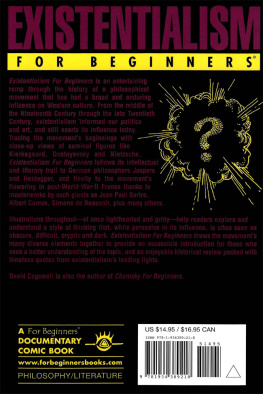
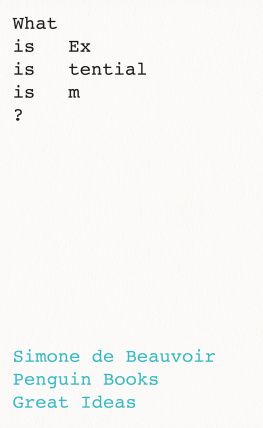
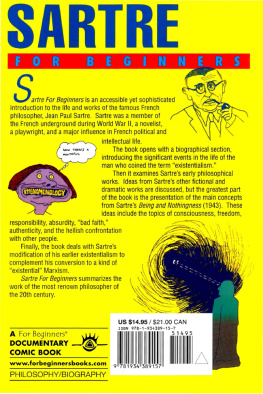
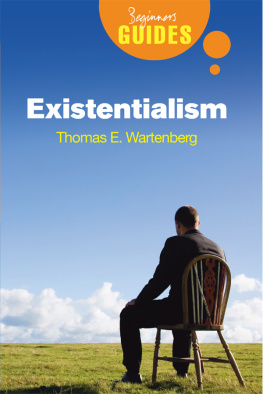

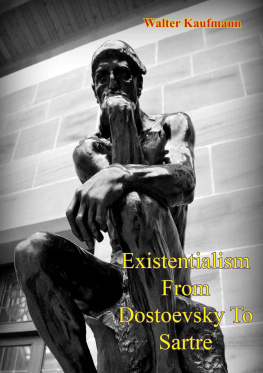
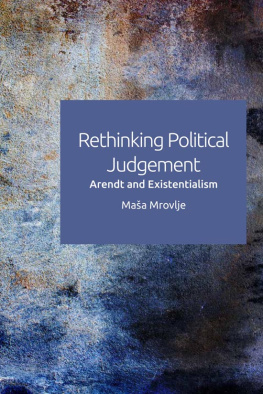
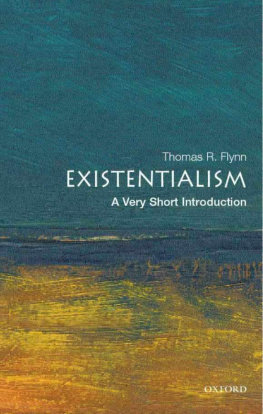
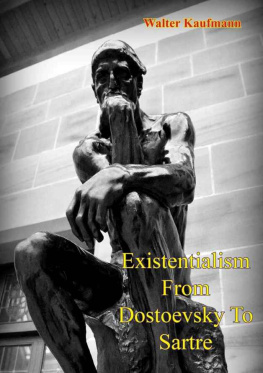
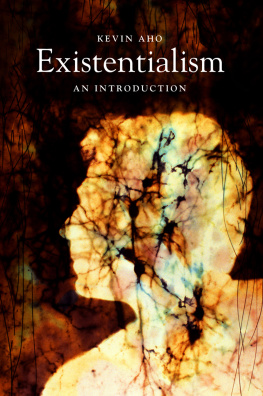




 The Biblical view of the world created in six days was shattered when people were suddenly struck with the fact that the earth had a long history and had evolved over inconceivable stretches of time. A flood of similarly earthshattering new realities presented themselves to Western Civilization forcing prevailing systems of thinking to stretch to accommodate them.
The Biblical view of the world created in six days was shattered when people were suddenly struck with the fact that the earth had a long history and had evolved over inconceivable stretches of time. A flood of similarly earthshattering new realities presented themselves to Western Civilization forcing prevailing systems of thinking to stretch to accommodate them. Objectivity, which requires mentally placing oneself outside of that which is being discussed, was seen as the most valid and reliable way of thinking. Existential philosophy grew from the feeling that a new, more agile kind of reasoning was needed, one that could accommodate the movement of time, the expanding universe and the increasing power in the hands of mankind.
Objectivity, which requires mentally placing oneself outside of that which is being discussed, was seen as the most valid and reliable way of thinking. Existential philosophy grew from the feeling that a new, more agile kind of reasoning was needed, one that could accommodate the movement of time, the expanding universe and the increasing power in the hands of mankind. From the ruins of religion
From the ruins of religion